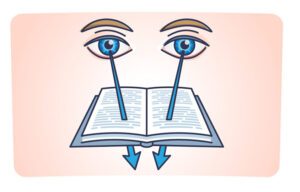ADHD & Visual Impairment
Did you know that your eyes can reveal symptoms of Attention Deficit Hyperactivity Disorder? Attention Deficit Hyperactivity Disorder (ADHD) is a term we all know, but let’s dig a little deeper: it is a common condition, usually diagnosed in childhood, that affects an individual’s attention span, behavioral control, and visual processing. Patients with ADHD oftentimes experience visual problems such as eye strains, blurred/double vision, or focusing issues. Inversely, these symptoms are actually caused by visual issues.
Links Between ADHD and CI
Convergence Insufficiency (CI) refers to a common vision condition in which your eyes are unable to work together while looking at nearby objects. Think about it this way: when we focus on objects up close, our eyes are forced to move inward, allowing our brain to create images. This is called “convergence.” When your eyes are unable to correctly align, the brain is unable to merge these photos. As a result, patients experience symptoms like blurred vision, fatigued eyes, and/or double vision—all of which are also symptoms of ADHD. Although there are different resources and exercises to treat convergence insufficiency, many times patients are given incorrect treatments due to misdiagnosis.
Does My Child Have ADHD or Convergence Insufficiency?
If your child has trouble concentrating, completing work, or being attentive at school, the question of whether or not they have ADHD has probably crossed your mind. However, due to the mimicking behaviors and symptoms of vision disorders, it is crucial to rule out any undetected underlying visual issues.

Since all these symptoms suggest ADHD, it can be difficult for the public, and even doctors, to accurately diagnose whether it’s CI, ADHD, or both. Researchers as the American Academy of Optometry suggest that untreated vision problems can consume more of a child’s executive function – the skills that enable them to remember, learn, organize, focus, etc.
It is important to schedule your child for a comprehensive eye examination in order to accurately treat their specific condition. These eye exams allow doctors to assess a patient’s vision functions by tracking their image processing speed, voluntary/involuntary eye movements, and eye convergence.
Does ADHD Affect Eye Movement?
Short answer? Yes. Long answer? Yes and no. We know. It’s complicated.
Recent studies have found sufficient evidence regarding the overlapping conditions. Andrea Miller-Scholte, CO, COMT, of the Ratner Children’s Eye Institute, conducted a study to see the correlation between children with convergence insufficiency and ADHD. She was able to find that there is an apparent three-fold greater incidence of ADHD in those suffering from CI, concluding that an ADHD diagnosis occurs three times as often in children suffering from convergence insufficiency. 1

In another recent study conducted by the American Academy of Optometry, researchers found that children with vision problems were two times more likely to develop ADHD compared to their peers with “normal” vision. They were able to conclude that “children with vison problems should be monitored for signs and symptoms of ADHD, so that dual impairment of vision and attention can be best addressed”. 2
So yes, evidence shows that there is a correlation between vision impairment and attention deficit hyperactivity. But how?
There are different possibilities as to why this happens.
How Does It Work?
Experts theorize that the additional effort required for individuals to visualize and understand the world around them can leave them feeling drained. This results in less energy when they use their executive functions – remember, those are the skills that enable us to remember, learn, organize, focus, etc.
Dr. Miller-Scholte's research suggests that hypertension, and its increase in the patient’s interpupillary distance (the distance between your two pupils), can also contribute to the symptoms of Convergence Insufficiency. Experts also believe that since Convergence Insufficiency is a comorbid disorder with ADHD (both diseases can occur at the same time), ADHD medications could actually be the cause of some vision disorders.
Conclusion
Experts theorize that the additional effort required for individuals to visualize and understand the world around them can leave them feeling drained. This results in less energy when they use their executive functions – remember, those are the skills that enable us to remember, learn, organize, focus, etc.
Dr. Miller-Scholte's research suggests that hypertension, and its increase in the patient’s interpupillary distance (the distance between your two pupils), can also contribute to the symptoms of Convergence Insufficiency. Experts also believe that since Convergence Insufficiency is a comorbid disorder with ADHD (both diseases can occur at the same time), ADHD medications could actually be the cause of some vision disorders.
Resources:
Granet, D. B., Gomi, C. F., Ventura, R., & Miller-Scholte, A. (2005). The relationship between convergence insufficiency and ADHD. Strabismus, 13(4), 163–168. https://doi.org/10.1080/09273970500455436
Hunterdon Vision Therapy Center. (n.d.). Eye tests, exams & therapy for kids and adults with ADD ADHD. Eye Tests & Vision Therapy for Kids with ADHD, Adults, ADD, Attention Deficit Disorders in Newark – Jersey City NJ – Easton PA Metro Area. Retrieved August 16, 2022, from https://newjerseyvisiontherapy.com/vision-therapy-for-ADD-ADHD-eyes-attention-disorders#:~:text=Researchers%20at%20the%20American%20Academy,and%20manage%20time%20and%20space.
